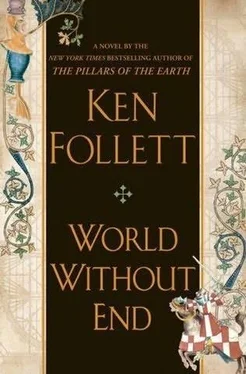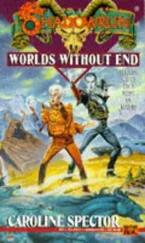There was no message from Madge about the dye.
Merthin had a second visitor that day. Towards the end of the afternoon, as trading petered out, Canon Claude arrived.
Claude’s friend and patron, Bishop Henri, was now installed as archbishop of Monmouth. However, his replacement as bishop of Kingsbridge had not been chosen. Claude wanted the position, and had been to London to see Sir Gregory Longfellow. He was on his way back to Monmouth, where he would continue to work as Henri’s right-hand man for the moment.
“The king likes Philemon’s line on taxation of the clergy,” he said over cold rabbit pie and a goblet of Merthin’s best Gascon wine. “And the senior clergy liked the sermon against dissection and the plan to build a Lady chapel. On the other hand, Gregory dislikes Philemon – says he can’t be trusted. The upshot is, the king has postponed a decision by ruling that the monks of Kingsbridge cannot hold an election while they are in exile at St-John-in-the-Forest.”
Merthin said: “I assume the king sees little point in selecting a bishop while the plague rages and the city is closed.”
Claude nodded agreement. “I did achieve something, albeit small,” he went on. “There is a vacancy for an English ambassador to the pope. The appointee has to live in Avignon. I suggested Philemon. Gregory seemed intrigued by the idea. At least, he didn’t rule it out.”
“Good!” The thought of Philemon being sent so far away lifted Merthin’s spirits. He wished there were something he could do to weigh in on Claude’s side; but he had already written to Gregory pledging the support of the guild, and that was the limit of his influence.
“One more piece of news – sad news, in fact,” Claude said. “On my way to London, I went to St-John-in-the-Forest. Henri is still abbot, technically, and he sent me to reprimand Philemon for decamping without permission. Waste of time, really. Anyway, Philemon has adopted Caris’s precautions, and would not let me in, but we talked through the door. So far, the monks have escaped the plague. But your old friend Brother Thomas has died of old age. I’m sorry.”
“God rest his soul,” Merthin said sadly. “He was very frail towards the end. His mind was going, too.”
“The move to St John probably didn’t help him.”
“Thomas encouraged me when I was a young builder.”
“Strange how God sometimes takes the good men from us and leaves the bad.”
Claude left early the next morning.
As Merthin was going through his daily routine, one of the carters came back from the city gate with a message. Madge Webber was on the battlements and wanted to talk to Merthin and Davey.
“Do you think she’ll buy my madder?” Davey said as they walked across the inner bridge.
Merthin had no idea. “I hope so,” he said.
They stood side by side in front of the closed gate and looked up. Madge leaned over the wall and shouted down: “Where did this stuff come from?”
“I grew it,” Davey said.
“And who are you?”
“Davey from Wigleigh, son of Wulfric.”
“Oh – Gwenda’s boy?”
“Yes, the younger one.”
“Well, I’ve tested your dye.”
“It works, doesn’t it?” Davey said eagerly.
“It’s very weak. Did you grind the roots whole?”
“Yes – what else would I have done?”
“You’re supposed to remove the hulls before grinding.”
“I didn’t know that.” Davey was crestfallen. “Is the powder no good?”
“As I said, it’s weak. I can’t pay the price of pure dye.”
Davey looked so dismayed that Merthin’s heart went out to him.
Madge said: “How much have you got?”
“Nine more four-gallon sacks like the one you have,” Davey said despondently.
“I’ll give you half the usual price – three shillings and sixpence a gallon. That’s fourteen shillings a sack, so exactly seven pounds for ten sacks.”
Davey’s face was a picture of delight. Merthin wished Caris were with him just to share it. “Seven pounds!” Davey repeated.
Thinking he was disappointed, Madge said: “I can’t do better than that – the dye just isn’t strong enough.”
But seven pounds was a fortune to Davey. It was several years’ wages for a labourer, even at today’s rates. He looked at Merthin. “I’m rich!” he said.
Merthin laughed and said: “Don’t spend it all at once.”
The next day was Sunday. Merthin went to the morning service at the island’s own little church of St Elizabeth of Hungary, patron saint of healers. Then he went home and got a stout oak spade from his gardener’s hut. With the spade over his shoulder, he walked across the outer bridge, through the suburbs and into his past.
He tried hard to remember the route he had taken through the forest thirty-four years ago with Caris, Ralph and Gwenda. It seemed impossible. There were no pathways other than deer runs. Saplings had become mature trees, and mighty oaks had been felled by the king’s woodcutters. Nevertheless, to his surprise there were still recognizable landmarks: a spring gurgling up out of the ground where he remembered the ten-year-old Caris kneeling to drink; a huge rock that she said looked as if it must have fallen from heaven; a steep-sided little valley with a boggy bottom where she had got mud in her boots.
As he walked, his recollection of that day of childhood became more vivid. He remembered how the dog, Hop, had followed them, and Gwenda had followed her dog. He felt again the pleasure of having Caris understand his joke. His face reddened at the recollection of how incompetent he had been, in front of Caris, with the bow he had made – and how easily his younger brother had mastered the weapon.
Most of all, he remembered Caris as a girl. They had been pre-adolescent, but nevertheless he had been bewitched by her quick wits, her daring, and the effortless way she had assumed command of the little group. It was not love, but it was a kind of fascination that was not unlike love.
Remembrance distracted him from pathfinding, and he lost his bearings. He began to feel as if he was in completely unfamiliar territory – then, suddenly, he emerged into a clearing and knew he was in the right place. The bushes were more extensive; the trunk of the oak tree was even broader; and the clearing in between was gay with a scatter of summer flowers, as it had not been on that November day in 1327. But he was in no doubt: it was like a face he had not seen for years, changed but unmistakable.
A shorter and skinnier Merthin had crawled under that bush to hide from the big man crashing through the undergrowth. He remembered how the exhausted, panting Thomas had stood with his back to that oak tree and drawn his sword and dagger.
He saw in his imagination the events of that day played out again. Two men in yellow-and-green livery had caught up with Thomas and asked him for a letter. Thomas had distracted the men by telling them they were being observed by someone hiding in a bush. Merthin had felt sure he and the other children would be murdered – then Ralph, just ten years old, had killed one of the men-at-arms, showing the quick and deadly reflexes that had served him so well, years later, in the French wars. Thomas had despatched the other man, though not before receiving the wound that had ended in his losing his left arm – despite, or perhaps because of, the treatment given him in the hospital at Kingsbridge Priory. Then Merthin had helped Thomas bury the letter.
“Just here,” Thomas had said. “Right in front of the oak tree.”
There was a secret in the letter, Merthin knew now; a secret so potent that high-ranking people were frightened of it. The secret had given Thomas protection, though he had nevertheless sought sanctuary in a monastery and spent his life there.
Читать дальше












